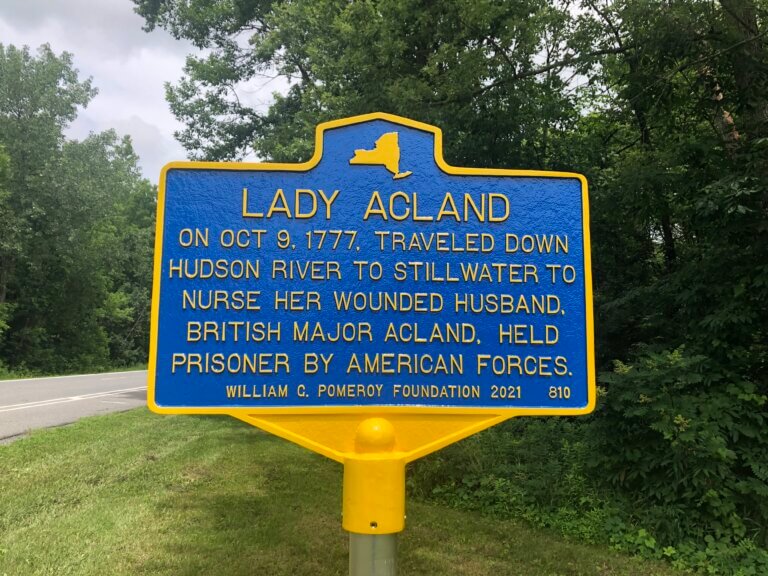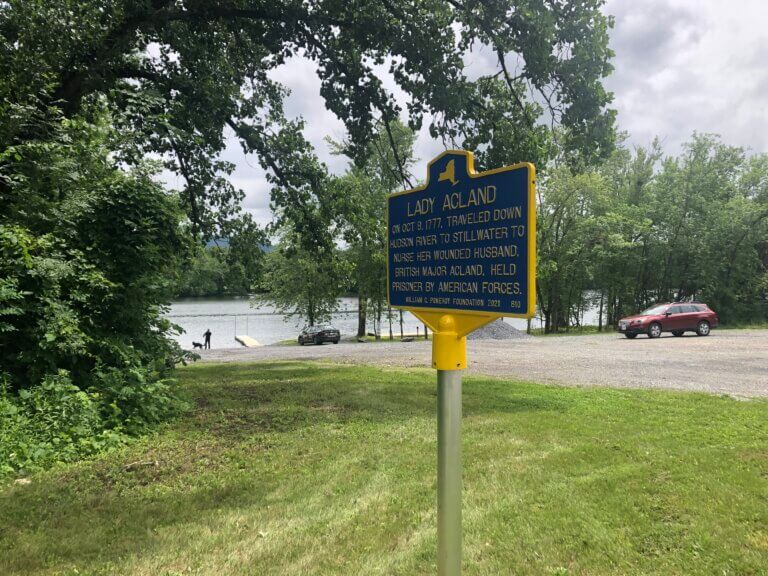LADY ACLAND
- Program
- Subject
- Location
- Lat/Long
- Grant Recipient
-
NYS Historic
-
Event, People
- 780-788 US-4, Schuylerville, NY 12871, USA
- 43.0361, -73.5928
-
Town of Saratoga
LADY ACLAND
Inscription
LADY ACLANDON OCT 9, 1777, TRAVELED DOWN
HUDSON RIVER TO STILLWATER TO
NURSE HER WOUNDED HUSBAND,
BRITISH MAJOR ACLAND, HELD
PRISONER BY AMERICAN FORCES.
WILLIAM G. POMEROY FOUNDATION 2021
During the American Revolution it was not uncommon for the family of military officers to accompany them to camp. This was the case for Major John Acland, who brought his wife Lady Harriet Acland with him. In the final days of the Saratoga Campaign, British Major John Acland was wounded in battle and subsequently taken prisoner. News that Major Acland was wounded and taken captive quickly reached his wife. Worried about her husband and the severity of his wounds, Lady Acland implored British General John Burgoyne to allow her to cross American lines in order to care for him. Burgoyne describes his account of the war in his publication “A State of the Expedition from Canada”:
I received a message from Lady Harriet, submitting to my decision a proposal (and expressing an earnest solicitude to execute it, if not interfering with my deigns) of passing to the camp of the enemy, and requesting General Gates’s permission to attend her husband. Though I was ready to believe (for I had experienced) that patience and fortitude, in a supreme degree, were to be found, as well as every other virtue, under the most tender forms, I was astonished at this proposal. After so long an agitation of the spirits, exhausted not only for want of rest, but absolutely want of food, drenched in rains for twelve hours together, that a woman should be capable of such an undertaking as delivering herself to the enemy, probably in the night, and uncertain of what hands the might first fall into, appeared an effort above human nature.
Burgoyne acquiesced to her request. On October 9th, 1777, Lady Acland traveled from the British lines, down the Hudson River, to the American lines at Stillwater. General Burgoyne’s account explains:
The assistance I was enabled to give was small indeed j I had not even a cup of wine to offer her; but I was told she had found, from some kind and fortunate hand, a little rum and dirty water. All I could furnish to her was an open boat and a few lines, written upon dirty and wet paper, to General Gates, recommending her to his protection. Mr. Brudenell, the chaplain to the artillery (the fame gentleman who had officiated so signally at General Fraser’s funeral) readily undertook to accompany her, and with one female servant, and the major’s valet-de-chambre (who had a ball which he had received in the late action then in his shoulder) she rowed down the river to meet the enemy. But her distresses were not yet to end. The night was advanced before the boat reached the enemy’s outposts, and the sentinel would not let it pass, nor even come on shore. In vain Mr. Brudenell offered the flag of truce, and represented the state of the extraordinary passenger. The guard, apprehensive of treachery, and punctilious to their orders, threatened to fire into the boat if it stirred before day-light. Her anxiety and suffering were thus protracted through seven or eight dark and cold hour; and her reflections upon that first reception could not give her very encouraging ideas of the treatment the was afterwards to expect. But it is due to justice at the close of this adventure to say, that she was received and accommodated by General Gates with all the humanity and respect that her rank, her merits and her fortunes deserved.
Lady Acland reached her husband. In the days that followed General Burgoyne surrendered at Saratoga on October 17, 1777.




